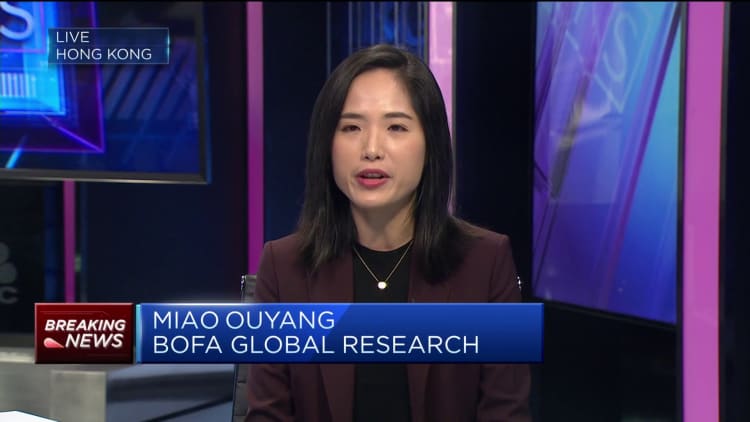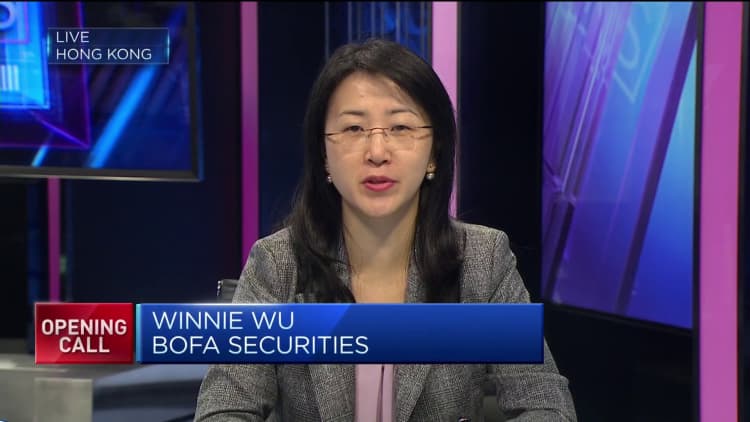China reported Friday its industrial output expanded at the fastest pace since February 2022 in November, though retail sales growth missed expectations, pointing to a patchy recovery in the world's second-largest economy.
Economists are approaching the China data with some caution, given a low base effect. The country was in the final months of its stringent zero-Covid curbs in the last quarter of 2022, which had adversely impacted the economy.
"The data is a mixed bag," Miao Ouyang, Bank of America's Greater China economist, told CNBC. "If you look at the whole set of data, it still shows that domestic demand is still on the weak side...and [the government] still definitely needs to do more to stabilize the economy."
China's industrial output grew 6.6% in November from a year earlier, according to the country's National Bureau of Statistics Friday. This outpaced expectations for 5.6% in a Reuters poll and follows a 4.6% rise in October.
Retail sales climbed 10.1% in November from a year ago, the fastest pace of growth since May — though analysts had expected a 12.5% spike following a low base in 2022. Retail sales rose 7.6% in October.
"Year-on-year growth in retail sales also rose in November, thanks mainly to faster automobile and Covid-sensitive restaurant sales growth on the back of favorable base effects, although this is well below market (high) expectations and implies a negative sequential growth," Goldman Sachs economists led by Lisheng Wang wrote in a note.
Fixed asset investment in urban areas cumulatively grew 2.9% in the first 11 months of the year, compared with expectations for 3% growth. China's urban unemployment rate stayed at 5% in November.

Hong Kong shares, among this year's underperformers in Asia Pacific, saw gains briefly accelerate after the release of Friday's data. The Hang Seng pared those gains to eventually close up 2.4% on the day.
The CSI 300 benchmark of the largest blue chips listed in Shanghai and Shenzhen gave up modest gains to close down 0.3% on the day.
Still fragile
The post-Covid recovery of the world's second-largest economy has so far fallen short of expectations, plagued by a festering real estate crisis, debt risks and chronic youth unemployment.
A slew of policy support measures have not sufficiently lifted economic sentiment, igniting calls for Beijing to amp up its stimulus amid fears of a deepening slowdown.
Still, there are several green shoots that point to Beijing's focus on growth, while also underscoring the depths of the real estate malaise.
On a cumulative basis in the first 11 months, investments in infrastructure and manufacturing increased 5.8% and 6.3%, year-on-year, respectively; retail sales rose 7.2%, while real estate development investment dropped 9.4%, China's NBS said.
Official data released earlier Friday showed that China's new home prices fell for the fifth straight month in November, underscoring weak confidence in demand and investment as some of the largest real estate developers are facing serious debt problems as Beijing strives to deleverage its once-bloated real estate sector.

A raft of recent economic data has demonstrated softening domestic demand, which was among the core focuses of a document that China's leaders released Tuesday evening at the end of a meeting charting economic priorities for 2024.
Previously, data showed China's consumer prices fell in November at their fastest rate in three years, while producer price deflation extended into the 14th month. In U.S. dollar terms, imports fell by 0.6% year-on-year, missing Reuters' forecast for a 3.3% rise.



